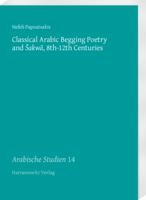|
Download:
Bitte beachten Sie: Mit digitalen Produkten in Ihrem Warenkorb
wird die Bezahlung nur per PayPal möglich. Der Download dieser Produkte wird bereitgestellt, wenn die Bezahlung bestätigt ist. This monograph traces the history of two little-known and understudied genres of classical Arabic poetry, begging and complaint (šakwā) poetry, from their beginnings to the end of the 12th century. The two genres are interrelated and have therefore been studied here in parallel.
Begging poems are petitions in verse addressed to a patron in which the poet poses as poor, dispirited and in need of support. Poets described their supposed poverty using striking, yet patently unrealistic, exaggerated images (starved families, ramshackle houses, tattered clothes, squalor, mishaps, etc.), with a view not only to arousing the patron’s sympathy but also to amusing him. Complaint poetry, on the other hand, aired the most diverse kinds of grievances, but by far most common and therefore important were general plaints about one’s times, contemporaries and milieu, as well as complaints about one’s financial predicament. The study considers only these two categories of grievances which are closely related with begging verse. For the blame of one’s times, contemporaries and milieu centered on the supposed ignorance, baseness and stinginess of the poet’s coevals, the disregard of culture, merit and talent, and the resulting misery and lack of prosperity of the men of letters. The study shows that, since the 10th century, such moans became clichéd themes of contemporary poetry, which poets felt obliged to include in their repertoire and which they mostly cultivated as a literary exercise. It is therefore wrong to take them literally or to regard them as subversive literature. Besides breaking new ground in classical Arabic literature, the book will be of interest to comparatists. |
|||||||||||||||||||||||||||||||||||||||






